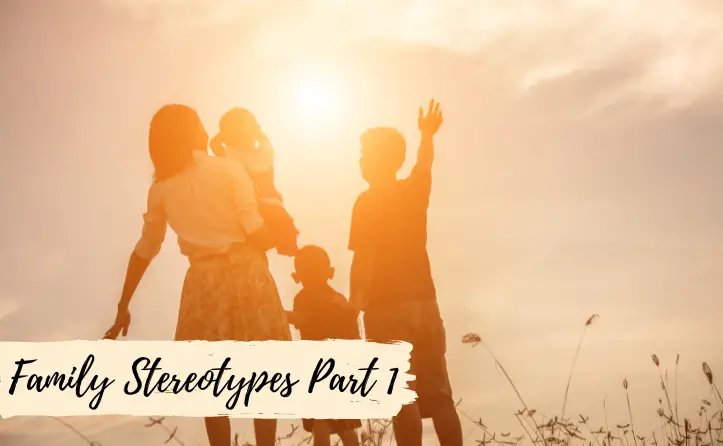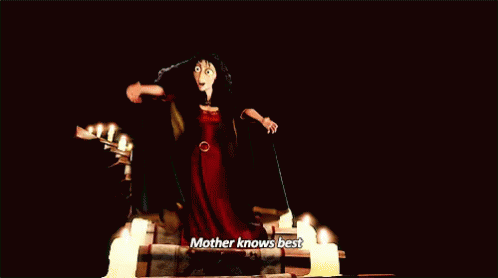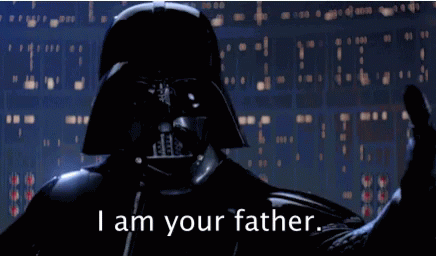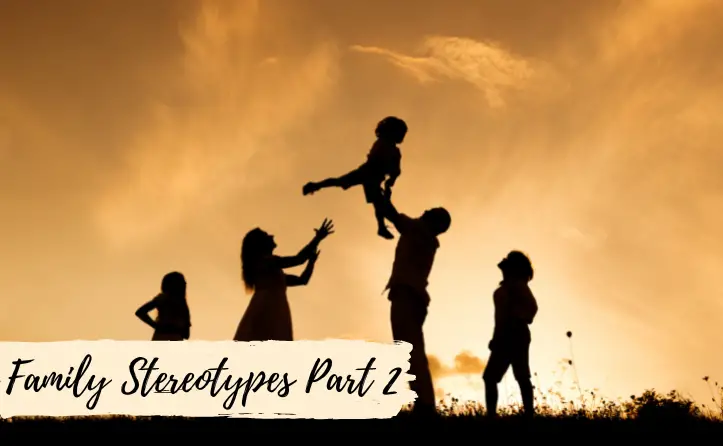By Rachel Leitch
Fictional families are my favorite.
I mean, Cinderella’s relationship with her parents and sisters was just so well done and nuanced. It’s such a good thing that Elsa and Anna had their parents to depend on when things were tough. And where would Luke Skywalker be without his supportive father?
Oh. Wait. You mean, none of them actually had any of those things?
While some of our favorite stories rose to success despite them, tropes like these quickly devolved into stereotypes that snaked their way into many books and movies. And thanks to that, creating a family for a protagonist is now a minefield for any unsuspecting author.
What if there were some simple tips that would steer us around most of those gaping stereotypes?
Now that might just be as impressive as a well-developed fictional family.
In this two-part article, we’ll identify some of the most common stereotypes when it comes to fictional families, as well as discover ways to turn those tropes on their heads.
Families in General
We can’t discuss stereotypes about families if your character, you know, doesn’t have a family! Ironically, one of the biggest stereotypes with families is the protagonist’s lack of family. This trope manifests itself in many ways.
If the family is present, it is absolutely perfect–Mom and Dad are constantly smooching and the siblings never fight, which still succeeds in keeping them largely out of the plot.
Where Did This Come From? While this stereotype isn’t genius when it comes to representation, it is genius in forcing character growth. Somewhere along the line, an author figured out that taking out a supportive family forced the character to learn and do things for themselves more quickly. Which is true. And so it spread like wildfire through books and movies. Quite simply put, it’s an easy way out.
While some of these scenarios are easier to spot than others, all of them work towards the same problematic goal.
The Problem Is . . . While this approach gets your character out in the world and learning, it presents family as something that slows you down, something that hinders your dreams, something that you need to be rid of if you’re ever to become your own person. If the family is broken or abusive, it’s easy to leave it behind. If the family is perfect, it can quietly co-exist in the background and never interrupt the plot. And, of course, if there’s no family or siblings at all, boom, problem solved.
How Do We Fix It? Think of ways that families can add to your character’s inner and outer battles in the story, rather than ways they detract from them.
More often than not, a family will not only make a stronger story, but it may actually be necessary for your character’s growth. No matter how you’re portraying them—absent, abusive, or supportive—ask these questions.
Even horrible families will have something good about them, and even “perfect” families have something flawed about them.
What if you’ve explored every avenue and separating them from their family is the only way to go? Depending on your story, that may be true. For instance, in one of my novels, the entire plot hinged on my protagonist being an orphan who is recruited to portray Anastasia Romanov. The plot kind of fell apart if she wasn’t an orphan.
Separating a family isn’t necessarily a wrong way to go. The key is to explore all the options and go with the one that is right for your story and your character.
Some Families to Study:
Parents in General
If your character is fortunate enough to have a family, then those parents better beware. Because of course, their child is way smarter than them. Even if the child literally breaks the law, never you fear, their actions will be rationalized in the end.
Where Did This Come From? I learned a lot of things as I became an adult. And one of the scariest things was that I might not have all the same preferences that my parents had. We might even *gasp* disagree on some things. For some people, those are relatively little preferences. For some people, those are big fundamental decisions.
It’s a big deal, one that I personally would love to see more in young adult fiction. And I think trying to get at that juicy conflict between being your parents’ child and becoming an adult is where this stereotype comes from.
The Problem Is . . . Even if my parent had the most twisted ideology in the book, I still couldn’t just go steal a car and have it all turn out fine. Even if I was saving the world. Maybe they’d pardon me, but I kind of doubt it.
This stereotype is a downward spiral from representing the healthy tension of becoming an adult into a no man’s land where anything the child says goes. This ignores all the life experience and thought that parents have to give to your main character.
How Do We Fix It? Obviously, if your main character’s mom is keeping her locked in a tower, that might be an appropriate time to disagree with Mom. Parents don’t always know best.
But perhaps a better method is to just hang out in that tension. Let your character make mistakes. Let their parents make mistakes. Let them both suffer consequences and see how it changes them, for better or for worse.
Some Parents to Study:
Dads
Dads get a hard hit in today’s books and movies. It seems there are two options when creating a dad.
-Option One: They are cruel or abusive.
-Option Two: They are out of touch and can’t even use the toaster without setting something on fire.
Where Did This Come From? Father wounds are incredibly damaging. Abandonment or abuse by a father figure takes one of the most fundamental needs of a human and leaves it gaping and bleeding. Many writers turn to writing as a way to process trauma (fun fact: it is one of the top recommendations therapists will make for someone processing trauma). So naturally, the trauma of father wounds bleeds onto the page as well.
When it comes to the clueless dad, well, I have some hard truth. All respect to the true dads out there, because you are amazing. But because dads are often at their job working hard most of the day, they can be a little clueless about the norms around the house. Sometimes, it’s just easier to let Mom do it.
The Problem Is . . . The abusive dad stereotype, while it needs to be written and represented, has become overused. And in becoming overused, it actually encourages distrust and distance, even in relationships where there is no cause for concern.
On the other hand, the clueless dad stereotype implies men are stupid. It insults their intellect and disregards the diversity of thought processes and problem solving skills.
How Do We Fix It? As I mentioned above, the abusive dad does need to be written. It is a sad reality for many, many people today who need to know they are not alone.
The problem comes when every dad is an abusive dad. If abuse is a topic you’re passionate about, consider these three tips.
Now onto the clueless dad. Every character has strengths and weaknesses. So maybe your dad really doesn’t know how to use the toaster. But what is his superpower?
Maybe he helps your MC develop good habits. Maybe he’s very involved in his kids’ lives and encourages them to follow their dreams. Maybe he helps tutor your character in the evenings or is his confidante on a secret mission. The possibilities truly are endless.
Beware of making your clueless dad the yes guy, though. While some dads are the ones you go to if you want a popsicle, others aren’t. So don’t make his superpower purely doting on his kids and letting them eat popsicles all the time.
Some Father Figures to Study:
Moms
Moms are the wonder women of books and movies. While I could lose count of how many books I’ve read that had main characters with father issues, I can think of zero that had mother issues.
Well, okay, fine, Cinderella. There’s that one.
Similar to dads, there seem to be two options when it comes to fictional moms.
-Option One: The mom is very meek and mild, loves baking, and loves on her kids all the time.
-Option Two: The mom is the “tough love” person who enforces discipline and keeps her clueless husband in line.
Or there’s always the Disney princess option—just don’t have a mom at all!
Where Did This Come From? Y’all, moms put up with a LOT. I don’t know how my momma does it. And somewhere in our awe and admiration, we want to put them on this pedestal as the perfect character. This comes out as either making the perfect soothing mom or the perfect strong mom, whichever suits our fancy most.
Femininity is also painfully misinterpreted, to the point where we have largely believed a woman is either baking and singing to animals or she is a karate master who plays with knives for fun.
The Problem Is . . . In our quest to celebrate moms, we’re actually demeaning them. We portray moms as either not having a say at all or having to claw and scratch to make their mark. Neither of those give an inkling of how strong being a woman actually is.
How Do We Fix It? I think the key to solving this is to just make your mom unique, just like you would any other feminine character. And for tips on doing that, you might just check out these articles:
Some Mother Figures to Study:
Conclusion:
Wait. WAIT. We’re not done already, are we? We haven’t even talked about SIBLINGS!
We’ll get there in part two of this article. But until part two comes, hopefully you have a springboard for starting your fictional family and a lot of ideas swirling around about your character’s parents.
Click here to read the second part!
Navigating Family Stereotypes: The Second Part - Siblings
The main thing to remember is that family is important, no matter what the tropes may say. It shapes who we are and who we might become. It comes with its problems, sometimes big problems. But it also comes with a strength and power that can’t be duplicated through something else.
And the parents who begin those families are so much more than just the titles given to them. They are unique people with dreams and fears and ghosts just like your main character.
I’d say with that, you’re off to a good start.
Who are some of your favorite fictional families and parents? Let’s chat about it in the comments below!
Rachel Leitch
Rachel Leitch discovered the book of writing when she was seven. She’s been turning pages ever since! When she’s not hidden away penning young adult historical adventures, she’s trying to fit all her reads on her shelf in a somewhat organized manner, rambling through history, daydreaming at the piano, or teaching students to be just as bookish as she is. In all her adventures, she learns how to shine brighter for the Father of Lights.
For more lessons drawn from books and movies and other stories (and to receive a free digital short story), follow her adventure journal at https://racheljleitch.weebly.com!






Bravo! Well said. . .errr, written. I don’t know if you have written part two (Of course you have because August 1st is in two days), but could you possible address twins/triplets? (Maybe you already did! I’ll have to wait and see.)
I wrote both parts at the same time, but that would have been an excellent point to include! I don’t have a lot of experience with twins or triplets, so I don’t have a lot of advice at the moment, but I can always do my research and find some. 😉
Out of curiosity, what was the story with a girl playing Anastasia you mentioned? Sounds an awful like the movie and musical, both of which I really enjoyed! I’d also like to mention Nia from the Wingfeather Saga as a strong, compassionate mother figure. Thanks for the article!
Nia is great, you are right.
Amazing Article! I can’t wait for the next one! Wonderful job, Rachel! I’m definitely adding this article to my favorites! 🙂 Wonderful Advice! Thank you!
Yay! I’m so glad this was helpful for you. I come from a big family, so it’s a topic that’s very interesting to me.
Of Course! I’ll definitely be coming back to this one. 😉 Haha, I understand. I myself am not from a big family. (middle kid and altogether only three kids. XD) However, my mom is the oldest of six girls, so…in some ways I do know what a big family is like. XD
I have 7 siblings, so this is super important to me
This is great! I really get the struggle here, because writing parents is hard for me, which is strange I know, but it is!
In the first book of my series, my heroine has a loving family, and I want the mother and father portrayed as mentioned above. The mother with wisdom and understanding, but not meek and timid, and the father with love and courage, but not stupid or dim witted-and there’s also a grandfather that brings another male father figure.
These father figures are especially important because there’s a not so great father figure in that same book, but I, like your sentiments above, don’t want to just show the bad in the world, but the good also.
I am definitely using these in my WIP, because I have been trying to escape the cliches of family.
Omw same
This was a great article! My dad often gets frustrated about how men are portrayed in commercials, movies, etc. One movie with great family dynamics is The Mitchels VS the Machines. For example, the mom, Linda, works as a kindergarten teacher, bakes cupcakes, embraces the nurturing role as a mother, AND can beat up a robot with fierce love for her children.